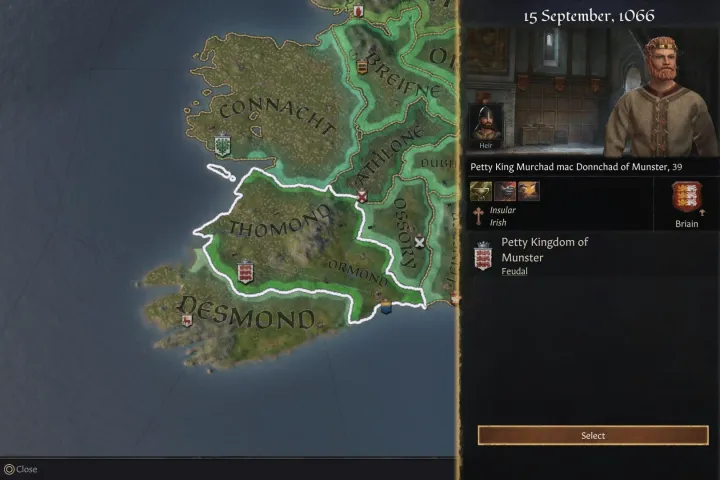Choosing your starting character in Crusader Kings III is no easy task with so many available rulers. Furthermore, since their stats reset every time, you’ll never know what you’ll get with any particular character. In a game as nuanced as Crusader Kings III, your entire dynasty hinges on who you choose at the very beginning and the decisions you make before ever unpausing the game. Let’s dive into some general strategies for choosing your ruler before getting into (what we believe) are three of the best starting characters in Crusader Kings III.
- Crusader Kings III beginner’s guide: 10 tips and tricks to get started
- The best games on Xbox Game Pass for 2022
- The best PS5 games for 2022
Tips for picking your starting character in Crusader Kings III

After completing the tutorial (which we highly recommend you do), you’ll finally get to start your Crusader Kings III adventure. After selecting New game, the game brings you to the world map. Here, you’ll have several decisions to make. When do you want to start your game, and who do you want to play as?
Reroll your stats
Before we get into some of the best starting characters in Crusader Kings III, there are several tips and tricks to choosing your ruler you should keep in mind.
You can’t see your starting skills until after you select your ruler. However, the game randomly generates these stats each time. If you don’t like what you got, you can always quit, start a new game, and pick them again.
For example, if you’re going for high stewardship in your first lifetime, you’d want to reroll your character until you get better skills. Be ready to compromise, though. You may get someone with 17 starting stewardship, but they might have other not-so-helpful traits.
That said, the educations of specific rulers remain unchanged. That means someone with a Martial education will always have a Martial education. The only thing that changes is their pre-assigned perks. We’ll touch on that later when going over our favorite starting characters in Crusader Kings III.
Unmarried or no heir (or both!)
As soon as you start your game, you’ll make your first major decision: Choosing your spouse. This choice can completely turn the tide of your game, so you must pick someone in line with your primary goal. If you’re looking to start wars right away, you’ll need to marry someone with strong alliance power. If you’re looking to build out your existing holdings first, you’ll want someone with better skills and solid inheritable traits. In both cases, starting with a predetermined spouse can hurt you more than it helps you.
Next, you’ll want to choose a character with either no heir or an heir you can push out in favor of your firstborn child. For example, if someone’s starting heir is their brother, your firstborn assumes that role once they’re born. But why is this so important when choosing your starting character in Crusader Kings III?
When you die, you’ll assume control of your heir. Therefore, you want to do everything you can to “build” the best heir in your first lifetime. That means marrying someone with good skills and traits, educating the child, assigning guardians, and playing mini-events to build their personality. If you can get good inheritable traits on your first heir, they’ll carry down through the rest of your game.
Starting with a predetermined heir (and one that won’t get pushed out) puts you at a disadvantage since it only allows for good inheritable traits in your grandchildren, aka your heir’s heir.
All that said, it’s tough to find a solid ruler without a spouse or heir. So, opt for one of those requirements when choosing your starting character in Crusader Kings III. The three we’ve listed later in this article fall into that “either or” category.
Should you start as a king?

You can play as a powerful ruler in Crusader Kings III right off the bat. You could choose Kaiser Heinrich IV of the Holy Roman Empire or Basileus Konstantinos X of the Byzantine Empire if you wanted to. The PC version of Crusader Kings III gives you a little more information from the start, allowing you to see the size of one’s army.
To get that same information on console, turn on your tooltips and hover over the capital of the realm you’re looking to control. You’ll see your military strength, succession laws, and line of succession. If you’re savvy about all the in-game traits, you can also see which you’ll start with. However, if you don’t know what they do, the tooltip won’t tell you (which is unfortunate).
It’s up to you if you want to begin as one of these powerful rulers. You’ll start with plenty of land and gold under your belt but will have several stressful decisions to make upon opening the game. Unless you’re a seasoned Crusader Kings III player, don’t dive headfirst into someone like Kaiser Heinrich of the Holy Roman Empire. Instead, start small, possibly as a Duke or Count within the Holy Roman Empire. Then, build your dynasty from there.
So, ruling out the powerful kings and emperors, what are some of the best starting characters in Crusader Kings III?
Count Roger of Messina — 1066

Count Roger controls a decent chunk of land in Sicily and on the boot of Italy. You’ll have to scroll into Messina to play as Roger, or you’ll control Duke Robert instead. Contrary to our advice, Roger is already married and has an heir. However, that heir is a daughter and will change to your firstborn son. As for your wife, you can take a handful of roads.
First (and this is true for any ruler beginning with a preset spouse), you can imprison them and then execute them. Sure, it’s harsh, but who said world domination was a humble game? If you fail, your spouse will leave your court. However, you’ll still be married. The best way to get around this is to back out and start a new game. Keep trying until you can “get rid of” your spouse. Of course, doing so rerolls your stats, so if you started with good skills and traits, you’d have to bite the bullet for a generation. So, inner-family conflict aside, why else do we like Roger of Messina?
Roger has a martial education, meaning he always starts with high martial stats and one of the three perk trees mostly filled out. He can declare Holy Wars on the three counties beneath Messina: Palermo, Agrigento, and Siracusa. This should be your primary objective when starting as Roger. Gain control over and create the Duchy of Sicily. From there, you can mold your heir into a high stewardship or knowledge build and start grinding out and upgrading the holdings in your domain.
You also have some daughters to marry off to form alliances if the Kingdom of Kairouan attacks you from the south. Finally, Duke Roger comes to your aid in the event of a hostile invasion.
As one final piece of advice, take over Agrigento first before tackling the other two. The same guy, Wali Muhammad, already controls both Palermo and Siracusa. Sometimes, they’ll form alliances if you wait too long. So declare a Holy War on Agrigento as soon as the game starts. If you lose (for some reason), back out and try again.
Remember that “getting rid” of your spouse costs piety and so does declaring Holy Wars. If you go negative on piety, you’ll become sinful, thus digging into a deep and unnecessary hole.
Petty King Munchard — 1066

You’ll remember Petty King Munchard from the Crusader Kings III tutorial. If you’re looking for some familiarity with your first campaign, he’s one of the best starting characters in Crusader Kings III. As the Petty King (or Duke) of Munster, he has a De Jure claim on the county of Desmond right below. However, this shouldn’t be your first move as Munchard.
The only downside to Munchard is his lack of personal holdings. Holdings under your direct control grant you 100% of the taxes and levies, meaning more gold and larger armies. Even though he’s a Duke, Munchard only starts with one holding (where Roger of Messina has three). Here’s how we change that.
His vassal, Ragnvald, oversees the county of Ormond. Before unpausing the game:
- Establish Limited Crown Authority, allowing you to revoke titles.
- Set your military to Automated.
- Attempt to revoke Ragnvald’s title. There’s a tiny chance he’ll accept, so prepare for war.
- Because your army is automated, they’ll spring into action as soon as Ragnvad rebels.
- Munchard will destroy him. Once the War Score hits 100%, enforce your demands.
- Since Ragnvald is now in jail, you can easily revoke his title. Then, execute him.
Now, you should have a large enough military to crush Muiredach in Desmond easily. He’ll become your vassal once you win the war, but we don’t want that. Revoke his title and repeat the steps from above. Now, you’ll have three domains under your control and a little bit of Tyranny to sway the next stages of the game.
Petty King Munchard can also have multiple spouses because of his religion. This gives you an excellent opportunity to find spouses with valuable inheritable traits. Thus, you can build a skilled lineage that’ll rule Ireland for centuries to come.
Earl Murchad mac Diarmait of Dubhlinn

Up the road from Petty King Munchard is another Irish ruler with the advantage of inheritance, making him one of our favorite starting characters in Crusader Kings III. Earl Murchad (yes, the Medieval names get very confusing) is the Earl of Dubhlinn. His father is the Earl of Leinster directly south. Papa Murchard is also 71, and most characters don’t live very long in Crusader Kings III.
While you tamper with finding your son/heir a suitable spouse and rearranging your council, Earl Munchard’s father should pass away, leaving you full control over Leinster. You can also pass the time by Fabricating a claim on Ossory. Once you win that war, you’ll be able to create the Duchy of Leinster.
Next, go after the Earldom of Athlone (next door to Dubhlinn) to create the Duchy of Meath. Don’t hesitate to revoke titles and go back on the offensive to fill out your domain limit.



